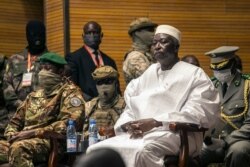The U.N.’s top envoy for Mali said Thursday that “success is within reach” with the formation of a transitional civilian government and the lifting of crippling sanctions imposed by West African regional bloc, ECOWAS.
“The transition stands as an opportunity for the people of Mali to emerge themselves and pull their country out of this hellish cycle, which has seen a succession of coup d'états,” U.N. Special Representative Mahamat Saleh Annadif told a U.N. Security Council meeting on the West African nation.
The U.N. has more than 14,000 peacekeepers and police in Mali. Because of the presence of extremist and terrorist groups in northern and central parts of the country, it is one of the U.N.’s most dangerous missions, with at least 220 peacekeepers killed since the mission was established in 2013.
Annadif said there is reason to hope for the quick implementation of the Transitional National Council, which is the legislative body for the 18-month transition period.
“This transition must lead to the holding of open, free and transparent elections within 18 months and the restoration of constitutional order,” said France’s U.N. envoy, Nicolas de Rivière. “France encourages the new authorities to take advantage of this period to lay the foundations for institutional reform.”
On Aug. 18, following anti-government street protests, Malian President Ibrahim Boubacar Keita was ousted in a widely condemned military coup. Regional bloc ECOWAS suspended Mali from its institutions and imposed sanctions, including an air embargo and suspension of financial transactions, pending the formation of a civilian transitional government. That government was formed on Monday, and on Tuesday, the West African bloc announced it had decided to lift the measures.
“Important tasks await the transition,” Niger’s Deputy U.N. Ambassador Aougui Niandou said on behalf of the council’s African members – Niger, South Africa and Tunisia, plus Caribbean nation Saint Vincent and the Grenadines. “Including the fight against terrorism, the restoration of peace and security throughout the country, and institutional reforms capable of restoring social peace in the country and full operationalization of the Northern Development Zone.”
He added that peace, security and stability in Mali is essential for all of West Africa, because violence there has spilled beyond Mali’s borders.
U.S. envoy Kelly Craft stressed that establishing the transitional government is only a first step, and she warned that spoilers could face international sanctions.
“The Security Council should be prepared to use the tools available to us should the transitional government fail to uphold its commitments,” she said.
She said the United States is committed to Mali’s progress and its Special Envoy for the Sahel J. Peter Pham visited the Malian capital, Bamako, last week. The U.S. also recently announced nearly $152 million for persons displaced by the conflict in the Sahel, of which some $54 million is earmarked for Mali.
The new government is composed of 25 ministers, of whom only four are women, falling short of a 30% quota by law.
“Why don't leaders understand that, to get to an inclusive government, you need a fair amount of women in these roles?” asked German Ambassador Christoph Heusgen.
Thursday’s meeting was the first time the 15-nation Security Council has met in person in its home chamber since the coronavirus pandemic hit New York in mid-March.
The council’s horseshoe-shaped table has been outfitted with plexiglass dividers and diplomats wore face masks when not speaking. The council has held mostly virtual meetings during the pandemic and more recently began meeting occasionally in a larger U.N. conference room that allowed for social distancing. Most U.N. staff based at the New York headquarters continue to work remotely.






